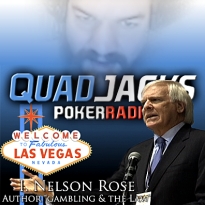 States are scrambling to react to the US Department of Justice’s about-face on the scope of the 1961 Wire Act. On Wednesday, Dennis Wilson, executive director of the Kansas Lottery, told a state Senate committee they had “a decision to make. We’re going to have to deal with this soon. This can get real wild.” See what you’ve done, DoJ? Kansas is talking about getting wild. Kansas! It’s anarchy, I tell you! Anarchy! SOYLENT GREEN IS PEOPLE!
States are scrambling to react to the US Department of Justice’s about-face on the scope of the 1961 Wire Act. On Wednesday, Dennis Wilson, executive director of the Kansas Lottery, told a state Senate committee they had “a decision to make. We’re going to have to deal with this soon. This can get real wild.” See what you’ve done, DoJ? Kansas is talking about getting wild. Kansas! It’s anarchy, I tell you! Anarchy! SOYLENT GREEN IS PEOPLE!
To help restore order to a topsy-turvy world, noted gambling lawyer and Gambling and the Law blog author Professor I. Nelson Rose recently sat down with QuadJacks.com’s increasingly hirsute host, Marco Valerio. (JihadJacks?) The two talked about the DoJ announcement/opinion/reinterpretation and how US states can best carpe this diem. Actually, Rose did most of the talking while Marco stroked his whiskers as if (a) trying to dislodge a particularly clingy crouton, or (b) auditioning to become the next Bond villain.
To underscore the significance of the DoJ opinion, Rose reminded listeners that Nevada passed legislation enabling online gambling (other than sports betting) way back in 2001, but the DoJ promptly sent Nevada a sternly worded letter saying this would violate the Wire Act, and Nevada backed down. Since then, the DoJ has been using violations of state laws as a springboard to a federal prosecution, which Rose sees as proof that prosecutors didn’t trust the Wire Act to hold up under court scrutiny. Savor the irony, poker players. The DoJ was bluffing.
Rose says that with the Wire Act now deemed to apply only to gambling on athletes or horses, the remaining federal statutes concerning gambling concern themselves strictly with illegal gambling. So long as it’s legal under state law, federal statutes (including UIGEA) don’t apply. The opinion also means there is currently no federal statute restricting the states’ ability to make gambling compacts with other states, or even between states and foreign countries. (Meanwhile, Rep. Joe Barton’s federal online poker bill, for which US players have shown so much support, would expressly prevent access to international liquidity.)
In terms of states forming interstate compacts, Rose believes the US online poker community would be better served if there was some kind of federal statute to help guide the states’ hands, but he doesn’t expect the feds to act on this for years. The 1978 Interstate Horseracing Act may have demonstrated that having federal guidelines in place enables states to accelerate adoption, but Rose is adamant that no such guidelines will emerge from Congress anytime soon, particularly with the Republicans controlling the House of Representatives.
You can watch the full discussion here. Be sure to watch both parts of the interview, if only to discover why US law enforcement has yet to storm Buckingham Palace with flash-bang grenades and an arrest warrant made out for ‘Her Nibs’. And we think you’ll find Marco’s follicular fumbling becomes strangely hypnotic after a while…
